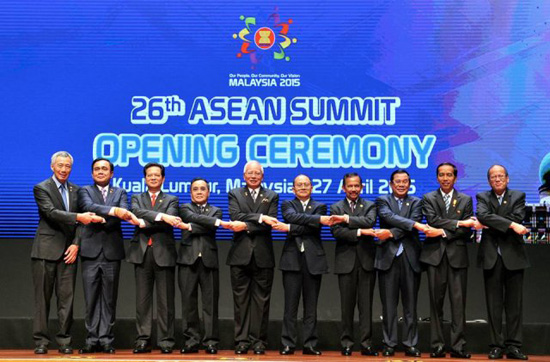
ASEAN-China Centre (ACC) would like to share information on key results of the 26th ASEAN Summit, held in Kuala Lumpur and Langkawi, Malaysia, on 26-27 April 2015. Major source of information was from Chairman's Statement, issued by Malaysia, the current Chair of ASEAN.

Malaysia successfully hosted the 26th ASEAN Summit where the 10 ASEAN Leaders had very useful and productive discussions under the theme "Our People, Our Community, Our Vision", making good headway in working together in order to launch ASEAN Community on time by the end of 2015.
The Leaders adopted three documents as outcomes of the Summit, namely; (1) Kuala Lumpur Declaration on a People-Oriented, People-Centre ASEAN, (2) Langkawi Declaration on the Global Movement of Moderates and, (3) Declaration on Institutionalizing the Resilience of ASEAN and its Communities and Peoples to Disasters and Climate Change.
On ASEAN Community building, the Leaders would further intensify the work to realize an ASEAN Community by the end of this year, with completion of remaining action lines in all three Blueprints (ASEAN Political Security Community or APSC, ASEAN Economic Community or AEC and ASEAN Socio-Cultural Community or ASCC), and set firm foundation for forward-looking Post-2015 Vision for a rules-based and people-centred ASEAN Community.
The Leaders welcomed the progress made in the implementation of the Master Plan on ASEAN Connectivity (MPAC) in promoting economic growth, narrowing development gaps and contributing to ASEAN integration and community building. They emphasized on the importance of addressing the various challenges in implementing MPAC initiatives, such as resource mobilization as well as coordinating MPAC initiatives which are multi-sectoral in nature. They welcomed the on-going efforts by the ASEAN Connectivity Coordinating Committee (ACCC) to formulate a Post-2015 Connectivity agenda, which should be bold, visionary and contain concrete and feasible measures, contributing to a better-connected ASEAN region.
On ASEAN external relations, the Leaders expressed their appreciation for the external partners' continued support for ASEAN Community building efforts and for initiatives which contribute to peace and stability of the region. They reiterated ASEAN's central role in shaping the evolving regional architecture and reaffirmed their commitment to further enhance and strengthen partnerships through various ASEAN-led mechanisms, including the ASEAN Plus One and Plus Three Mechanisms, the East Asia Summit (EAS) and the ASEAN Regional Forum (ARF).
The Leaders looked forward to the conclusion of the Upgrading of the ASEAN-China Free Trade Agreement (ACFTA) and the signing of the Protocol to incorporate the Trade in Services and Investment Chapters under the ASEAN-Japan Comprehensive Economic Partnership (AJCEP) Agreement. They also noted the good progress of the ASEAN-Hong Kong Free Trade Agreement (AHKFTA) negotiations.
In view of uncertainties of the global economy and growth slowdown in some other regions, the Summit underscored the importance of continued economic integration and partnerships with countries outside the region. The Leaders welcomed the progress made in negotiations for the Regional Comprehensive Economic Partnership (RCEP) and urged all parties to intensify efforts with the aim of concluding negotiations by end-2015.
At the closing session of the Summit on 28 April 2015, Dato' Sri Mohd Najib Tun Abdul Razak, Prime Minister of Malaysia, said: "It is clear we are making strong progress towards the establishment of the ASEAN Community by the end of this year. This is a very significant milestone in the history of our organization, and we must ensure that every effort is expended in pursuit of that goal....We will act to make the most of our region's tremendous potential "
Malaysia will also host the 27th ASEAN Summit and Related Summits in November 2015. The Related Summits include, among others, ASEAN-China Summit, ASEAN Plus Three Summit and East Asia Summit (including Australia, China, India, Japan, New Zealand, ROK, Russia and US).
ASEAN comprises 10 Southeast Asian Nations, which are Brunei Darussalam, Cambodia, Indonesia, Laos, Malaysia, Myanmar, the Philippines, Singapore, Thailand and Viet Nam. ASEAN and China launched the dialogue process in 1991. China became full dialogue partner of ASEAN in 1996. In 1997, the 1st ASEAN-China Informal Summit was held in Kuala Lumpur, Malaysia, and ASEAN-China relations were upgraded to be strategic partnership in 2003.